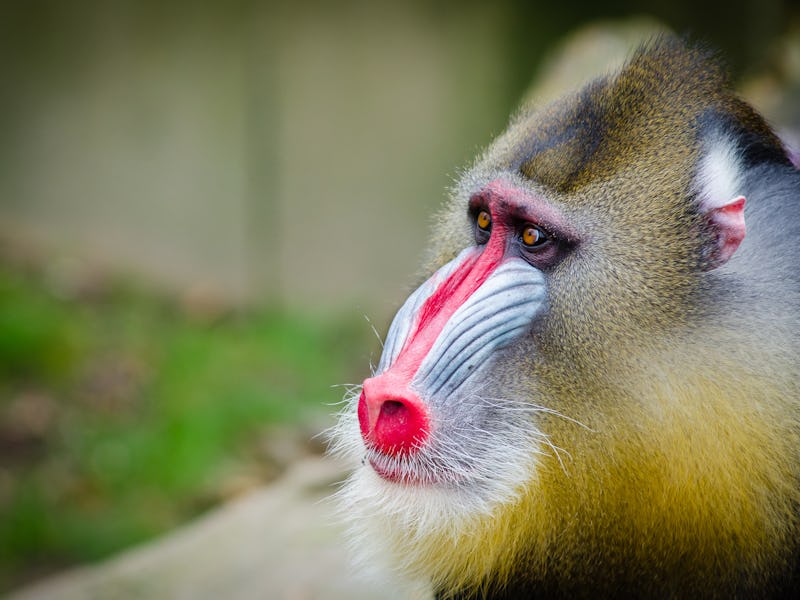Mandrills Can Teach Humans a Lesson in Disease Prevention
Quarantine makes all the difference.

Mandrills won’t groom a monkey that smells bad, and that goes a long way toward disease prevention.
Research published Wednesday in the journal Science Advances suggests that the West African baboons stay away, in particular, from fecal matter that has a smell associated with parasite infection. In effect, this process isolates and quarantines a monkey who could endanger the rest of them.
Grooming is, of course, a big deal for mandrills. It’s not just a necessity of picking out fleas and combing out hair so primates look their best — it’s also often a social indicator of acceptance, that that primate has met some threshold that deems them worthy of a fellow primate’s attention.
“Grooming is a fundamental component of primate sociality,” Clemence Poirotte, a researcher with the group, tells Inverse. “It serves several important social functions, including the maintenance of group cohesion, the buffering of the effects of inevitable within-group competition, and an enhancement of well-being and fitness of both the groomee and the groomer.”
A mandrill who has passed the poop smell test gets groomed.
But when a mandrill was infected with Balantidium coli — a dysentery instigator — or other similar parasites, their fellow mandrills stayed the hell away, using the unique scent of their poop as a warning siren. It’s not just poop, either: “Mandrills often investigate the odors of conspecifics, including conspecific’s peri-anal area,” Poirotte says.
Poirotte and her colleagues analyzed 25 mandrills for two and a half years in southern Gabon and observed this fascinating, albeit simple, behavior upfront. It’s part of a larger study on mandrills, one of the most socially apt, advanced primates in the world, with social structures that are very much human-like.
Poirotte and her team then treated 16 parasitized mandrills and found that once cured, the monkeys were welcomed back into mandrill. Their poop, it turns out, had chemically reverted to being more similar to the others, which mandrill noses picked up on. And it was definitely the stench of poop that worked here: The team placed samples of parasitized shit in some locations, along with everyday, run-of-the-mill mandrill crap in others. Yep: It wasn’t the mandrills, it was their infected poop.
How are mandrills like humans? The world’s biggest monkeys are extremely social creatures who live in sophisticated societies called hordes, structured by aggressive fighting that leads to dominant leaders, not unlike human political contests with a lot more MMA-style fighting (these matches are usually bloody and often deadly). While humans don’t exactly live in hordes, they do interact closely with each other in communities and groups that mimic mandrill societies — any flu season through an office will indicate that it doesn’t take much for one person to pass on a nasty virus to other unsuspecting bystanders.
“To focus on the context of this study, humans are, as mandrills, a social primate,” Poirotte explains. “The constant co-evolution between parasites and humans has also driven in our species the evolution of several behavioral defense mechanisms to avoid parasites — diseased people were put in quarantine, aversion to sick individuals, and so on.”
To the researchers, this is an indicator that mandrills are actually public health advocates that offer an important lesson rooted in evolutionary survival: If you’re sick, stay away from others. It’s called “behavioral immunity,” and it’s the reason why certain societies survive rampant disease more than others. And while smell has long been thrown aside as the lowest sense of the five we rely on to live, the mandrill study group suggest that our noses — whether they be the human kind or the mandrill kind — can be a matter of life and death for societies.